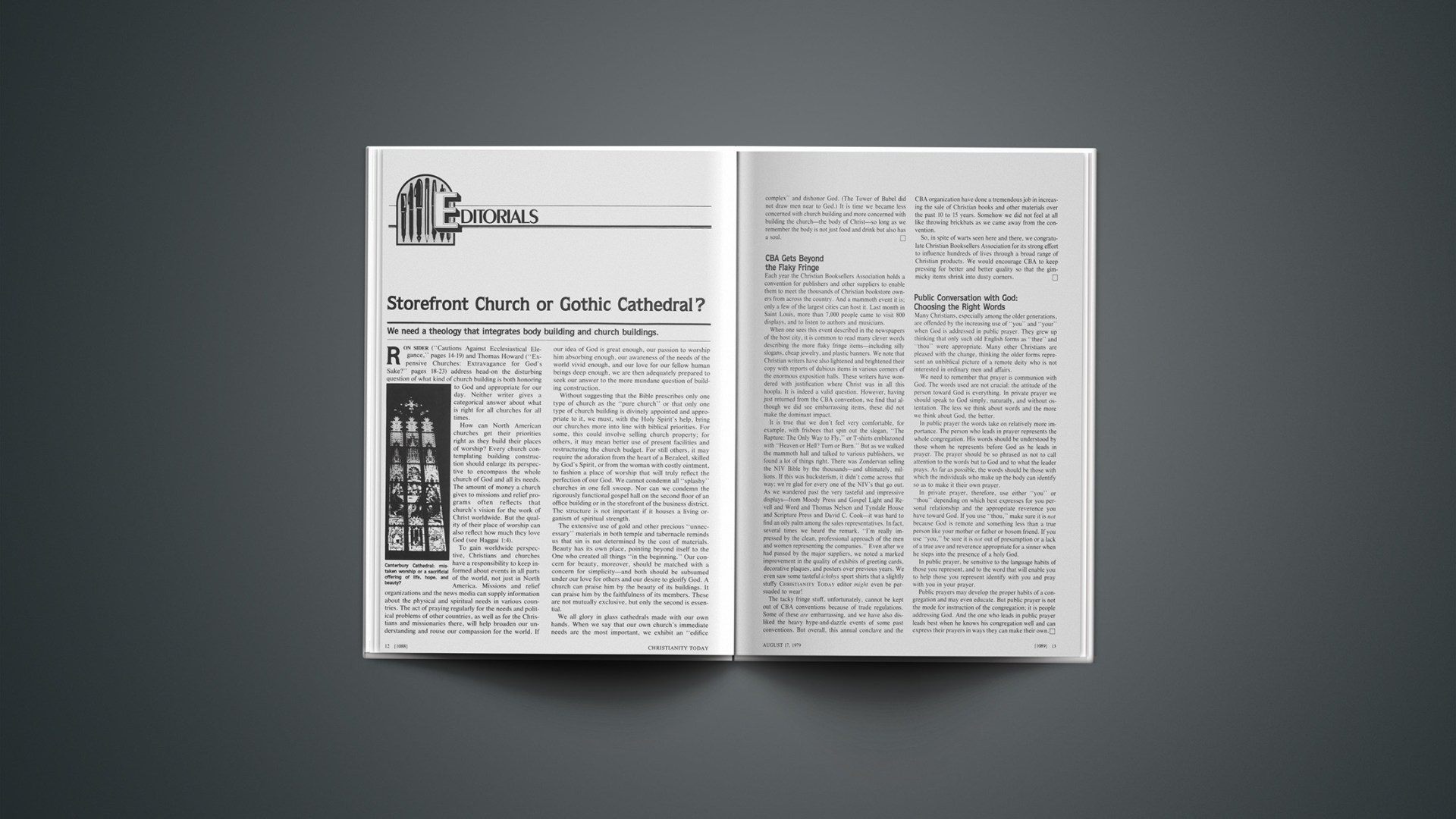Cba Gets Beyond The Flaky Fringe
Each year the Christian Booksellers Association holds a convention for publishers and other suppliers to enable them to meet the thousands of Christian bookstore owners from across the country. And a mammoth event it is; only a few of the largest cities can host it. Last month in Saint Louis, more than 7,000 people came to visit 800 displays, and to listen to authors and musicians.
When one sees this event described in the newspapers of the host city, it is common to read many clever words describing the more flaky fringe items—including silly slogans, cheap jewelry, and plastic banners. We note that Christian writers have also lightened and brightened their copy with reports of dubious items in various corners of the enormous exposition halls. These writers have wondered with justification where Christ was in all this hoopla. It is indeed a valid question. However, having just returned from the CBA convention, we find that although we did see embarrassing items, these did not make the dominant impact.
It is true that we don’t feel very comfortable, for example, with frisbees that spin out the slogan, “The Rapture: The Only Way to Fly,” or T-shirts emblazoned with “Heaven or Hell? Turn or Burn.” But as we walked the mammoth hall and talked to various publishers, we found a lot of things right. There was Zondervan selling the NIV Bible by the thousands—and ultimately, millions. If this was hucksterism, it didn’t come across that way; we’re glad for every one of the NIV’s that go out. As we wandered past the very tasteful and impressive displays—from Moody Press and Gospel Light and Revell and Word and Thomas Nelson and Tyndale House and Scripture Press and David C. Cook—it was hard to find an oily palm among the sales representatives. In fact, several times we heard the remark, “I’m really impressed by the clean, professional approach of the men and women representing the companies.” Even after we had passed by the major suppliers, we noted a marked improvement in the quality of exhibits of greeting cards, decorative plaques, and posters over previous years. We even saw some tasteful ichthys sport shirts that a slightly stuffy CHRISTIANITY TODAY editor might even be persuaded to wear!
The tacky fringe stuff, unfortunately, cannot be kept out of CBA conventions because of trade regulations. Some of these are embarrassing, and we have also disliked the heavy hype-and-dazzle events of some past conventions. But overall, this annual conclave and the CBA organization have done a tremendous job in increasing the sale of Christian books and other materials over the past 10 to 15 years. Somehow we did not feel at all like throwing brickbats as we came away from the convention.
So, in spite of warts seen here and there, we congratulate Christian Booksellers Association for its strong effort to influence hundreds of lives through a broad range of Christian products. We would encourage CBA to keep pressing for better and better quality so that the gimmicky items shrink into dusty corners.
Public Conversation With God: Choosing The Right Words
Many Christians, especially among the older generations, are offended by the increasing use of “you” and “your” when God is addressed in public prayer. They grew up thinking that only such old English forms as “thee” and “thou” were appropriate. Many other Christians are pleased with the change, thinking the older forms represent an unbiblical picture of a remote deity who is not interested in ordinary men and affairs.
We need to remember that prayer is communion with God. The words used are not crucial; the attitude of the person toward God is everything. In private prayer we should speak to God simply, naturally, and without ostentation. The less we think about words and the more we think about God, the better.
In public prayer the words take on relatively more importance. The person who leads in prayer represents the whole congregation. His words should be understood by those whom he represents before God as he leads in prayer. The prayer should be so phrased as not to call attention to the words but to God and to what the leader prays. As far as possible, the words should be those with which the individuals who make up the body can identify so as to make it their own prayer.
In private prayer, therefore, use either “you” or “thou” depending on which best expresses for you personal relationship and the appropriate reverence you have toward God. If you use “thou,” make sure it is not because God is remote and something less than a true person like your mother or father or bosom friend. If you use “you,” be sure it is not out of presumption or a lack of a true awe and reverence appropriate for a sinner when he steps into the presence of a holy God.
In public prayer, be sensitive to the language habits of those you represent, and to the word that will enable you to help those you represent identify with you and pray with you in your prayer.
Public prayers may develop the proper habits of a congregation and may even educate. But public prayer is not the mode for instruction of the congregation; it is people addressing God. And the one who leads in public prayer leads best when he knows his congregation well and can express their prayers in ways they can make their own.










